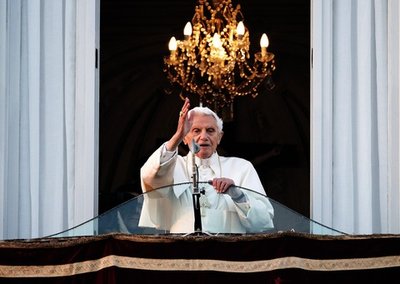When 85-year-old Pope Benedict XVI announced on Feb. 11 that he was stepping down from the papacy, the leaders of the Catholic Church became tasked to do what had never been done in the modern era: select a successor to a living pope.
 Pope Benedict XVI blesses the faithful for the last time from the balcony of his summer residence in Castel Gandolfo February 28, 2013. Pope Benedict left the Vatican on Thursday after pledging unconditional obedience to whoever succeeds him to guide the Roman Catholic Church at one of the most crisis-ridden periods in its 2,000-year history.
Cardinals representing the world’s 1.2 billion Catholics are gathered in Rome to determine when to convene what’s called a conclave, the secretive process through which a new pope is elected.
Pope Benedict XVI blesses the faithful for the last time from the balcony of his summer residence in Castel Gandolfo February 28, 2013. Pope Benedict left the Vatican on Thursday after pledging unconditional obedience to whoever succeeds him to guide the Roman Catholic Church at one of the most crisis-ridden periods in its 2,000-year history.
Cardinals representing the world’s 1.2 billion Catholics are gathered in Rome to determine when to convene what’s called a conclave, the secretive process through which a new pope is elected.
 People react near a giant screen showing the departure of Pope Benedict XVI from the Vatican City, February 28, 2013. Pope Benedict slips quietly from the world stage on Thursday after a private last goodbye to his cardinals and a short flight to a country palace to enter the final phase of his life "hidden from the world".
People react near a giant screen showing the departure of Pope Benedict XVI from the Vatican City, February 28, 2013. Pope Benedict slips quietly from the world stage on Thursday after a private last goodbye to his cardinals and a short flight to a country palace to enter the final phase of his life "hidden from the world".

The Voting Process
One hundred and seventeen cardinal-electors gather in the Sistine Chapel for the conclave, and after taking the oath of secrecy, write their selections on a folded card presented at the altar. All cardinals must vote; if there are more or fewer ballots than the number of cardinal-electors, all of the ballots are burned without inspection. Balloting continues until one cardinal receives two-thirds of all votes. Cardinals will go through the voting process twice in the morning and twice in afternoon, while after each vote, a counter writes down the names of the cardinals nominated by their peers. These names are placed in an urn and burned. If there’s a winner, chemicals are added to the urn to make the smoke white, and if there’s still no cardinal who garners two-thirds of the votes, the smoke is kept black to signify the balloting process has not yet yielded a new pope. When the cardinals have gone through three days of voting without a winner, they will break for a day of prayer.

